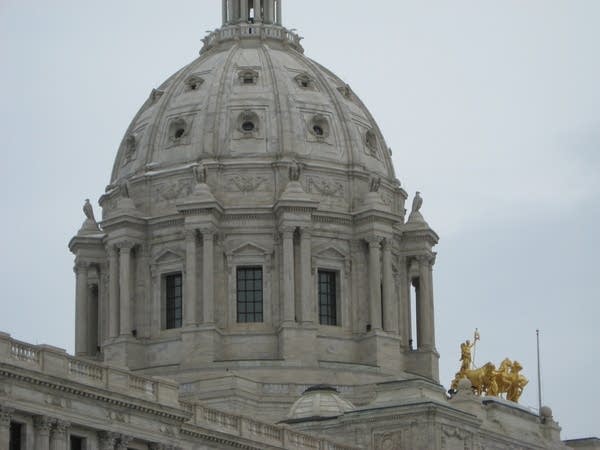Minn. Senate approves $1B borrowing plan
Go Deeper.
Create an account or log in to save stories.
Like this?
Thanks for liking this story! We have added it to a list of your favorite stories.

With little debate, Senators passed their version of the bonding bill Tuesday by a vote of 51 to 7. The House is scheduled to take up a similar bill on Thursday. But Gov. Tim Pawlenty is urging lawmakers to scale back the bill because of the projected state budget deficit.
The Senate bonding bill funds a long list of construuction projects at public colleges, state trails, parks, prisons and sports facilities.
Sen. Keith Langseth, DFL-Glyndon, said members of the Senate Capital Investment Committee had to pare down $3.5 billion in requests to get the $1 billion bill. Langseth said the bonding bill will create jobs, stimulate the sagging economy and ultimately save the state money.
"The best time to build is during a recession. We have many contractors now that are very hungry."
"You know, the best time to build is during the recession," he said. "We have many contractors now that are very hungry. They will be coming in with bids considerably smaller than they would be if the economy was booming. This is simply the best time to build. There are people out there who are unemployed in the construction trades."
Turn Up Your Support
MPR News helps you turn down the noise and build shared understanding. Turn up your support for this public resource and keep trusted journalism accessible to all.
About a third of the Senate bonding bill is dedicated to higher education projects, with an emphasis on the renovation and repair of existing campus buildings. There's also money for flood prevention projects, the Central Corridor light rail line and arena projects in Crookston, Bemidji, Duluth and St. Cloud.
But some Republicans argued the bill is too big. With the state's projected budget shortfall also approaching $1 billion, Sen. Geoff Michel, R- Edina, said the bonding bill should be cut back by 10 percent to about $825 million.

"In light of a recession, and in light of a state budget deficit, it seems like it would be prudent for us to out this bill on a diet," he said. "We should not be making promises we can't keep. We're going to be battling that for the next two months here at the Capitol."
Michel contends the bill's $965 million in general obligation bonding would exceed the state guideline of keeping new debt at 3 percent of expected state revenues.
Gov. Tim Pawlenty shares that concern. Pawlenty also proposed a nearly $1 billion bonding bill, but he's recently suggested scaling back to $825 million in light of the growing budget deficit.
Despite the Republican warnings, Langseth insisted the Senate bill still falls within the 3 percent guideline. He said the bill also includes language to spread out the bond sale to keep debt repayment costs in check.
The Minnesota House is expected to pass its version of the bonding bill Thursday. Langseth said a conference committee could then begin working out differences between the two bills by the weekend. He says a bill should reach the governor by Mar. 15.
Dear reader,
The trustworthy and factual news you find here at MPR News relies on the generosity of readers like you.
Your donation ensures that our journalism remains available to all, connecting communities and facilitating better conversations for everyone.
Will you make a gift today to help keep this trusted new source accessible to all?




